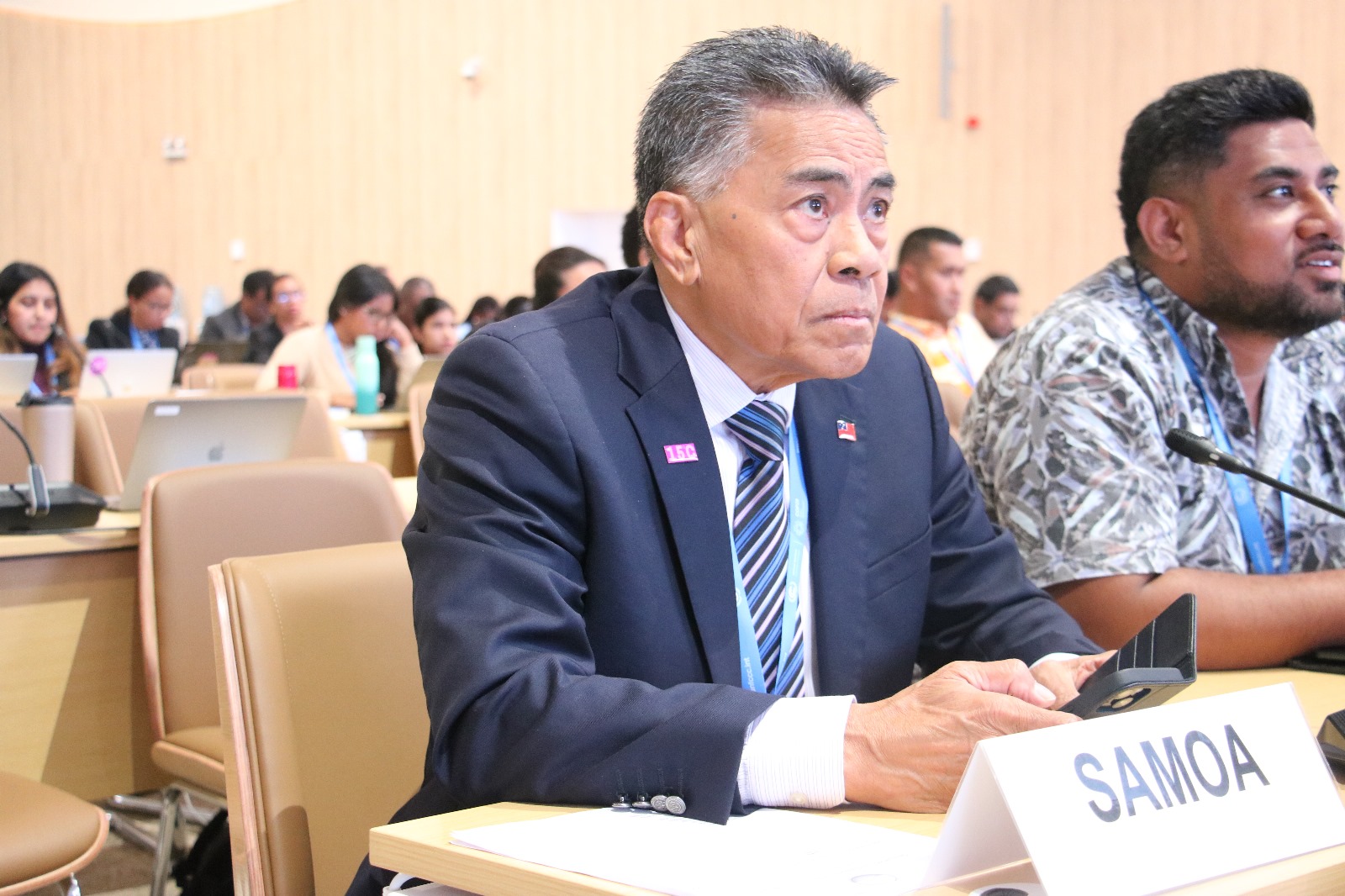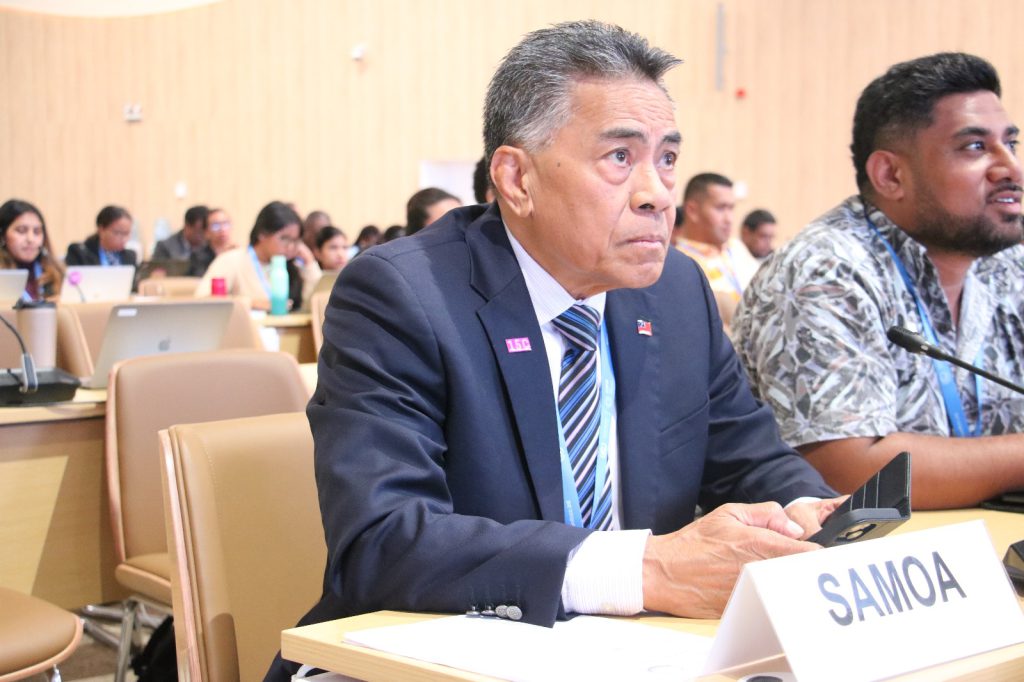STATEMENT
COP29 AOSIS Statement G77 and China Preparatory meeting
November 09, 2024 AOSIS Chair, Ambassador Dr. Pa’olelei Luteru Download PDFTopic: Climate

AOSIS Statement G77 and China Preparatory meeting Twenty Ninth Conference of the Parties to the UNFCCC AOSIS Statement G77 and China Preparatory meeting 09 November 2024, Baku Azerbaijan 9am Opening Remarks from the AOSIS Chair • Thank you, Chair, for the opportunity to reflect on the COP29 agenda. I wish to highlight a few key priorities for AOSIS. • First, we believe that adopting the COP29 agenda early is essential, as we have significant ground to cover here in Baku. The list of agenda items continues to expand since our arrival, underscoring the importance of a timely start. • We have seen how the evolving agenda could hinder a successful outcome in this process. It is essential that these additional items do not interfere with our substantive work moving forward. AOSIS urges that, as developing countries, we do not become an obstacle to progress, as this COP is of critical importance to us. • Our second point is the importance of a cover decision that drives the implementation and operationalization of the 1.5°C goal. This is a critical step in advancing ambition, as emphasized throughout this COP. The urgency for climate action resonates globally, and we must act swiftly to demonstrate international cooperation in addressing climate change on the ground. The shifting global landscape calls for renewed confidence in multilateralism, and we have a responsibility to deliver on this, aligning with the theme of this COP. • AOSIS views COP29 as a critical opportunity to accelerate climate action. The timely submission of NDCs aligned with the 1.5°C pathway, as highlighted in last year’s GST outcome is of urgency. It is essential to elevate the discussions on mitigation and achieve a substantive outcome from the Mitigation Work Programme here in Baku. We also call for timely submissions of Biennial Transparency Reports (BTRs). • Thirdly, we believe COP29 must deliver on the NCQG in a way that leaves no one behind, particularly those with the least capacity to address climate change. Recognizing the special circumstances of SIDS is essential, including establishing a 2 minimum access floor for SIDS within the NCQG decision. This decision should be grounded in the needs and priorities of developing countries and must remain aligned with the principles of the Paris Agreement. • It is crucial that we remain fully committed to the Paris Agreement as we work to operationalize this key enabler. This new goal will shape our pathway to achieving the 1.5°C target set nearly a decade ago in Paris. Current trends indicate we are exceeding this temperature goal; as we redefine our approach, our actions must align with the Paris Agreement. Developing countries now have an opportunity to pursue a development path that is sustainable for our planet. The only way to achieve this is by staying true to the purpose and objectives of the Paris Agreement. • Our group of developing countries is highly diverse, with varying needs, development levels, and capacities to address climate change. To effectively uphold the interests of the G77 and China as a whole, it is essential that we prioritize and protect the interests of those parties with the least capacity. By doing so, we ensure a comprehensive and fully integrated approach to addressing our shared challenges. • AOSIS believes that unity within the G77 is essential for achieving successful outcomes in Baku, particularly on critical issues such as finance, adaptation, and loss and damage. However, we emphasize the need to approach this unity with careful consideration to ensure that this unity does not come at the expense of any group’s interests. • Our fourth points is with regard to the GST. We remain steadfast in our commitment and optimistic that the key issues before us will be addressed here in Baku. It is crucial that we maintain focus on the implementation of the GST outcomes, particularly the energy package, which is vital for advancing the transition to climate-resilient pathways. Looking ahead to future GSTs, the IPCC must continue to play a central role, as we saw its pivotal contribution last year. AOSIS has always been, and will remain, a strong advocate for science-based decision-making. Given that the UNFCCC does not produce comprehensive scientific assessments or conduct thorough scientific reviews of the current climate status, the inclusion of science in this process is essential to avoid undermining its integrity. • On matters related to adaptation, AOSIS want to ensure that Article 9.4 is operationalized in the context of GGA. Special needs and circumstances of SIDS and LDCs is not something we can’t overlook. Our NDCs presents several of adaptation efforts and pathways that we would require provision to access grant-based finance for adaptation measures. • On the GGA work programme on indicators, we would like to address the uneven representation of SIDS across expert groups, which is an issue for most of the subgroups within the G77. This imbalance risks sidelining some SIDS priorities in themes without a SIDS expert, impacting the universality of the indicators. We need to urge the SB Chairs to emphasize cross-group collaboration and ensure that all regional priorities are fully reflected in the analysis and refinement of indicators. • We see WIM review from this COP as a significant milestone. This review is taking place at a time when the loss and damage finance landscape is evolving, and considering these aspects in the review will be essential to guiding our work on the fund and the broader WIM framework. • The sixth point we wish to highlight is concerns on Just Transition. It is important not to undermine the role of adaptation in the just transition pathway. Adaptation remains a cornerstone for SIDS, and we firmly believe it requires urgent attention, particularly in the implementation of adaptation outcomes from the GST, as well as in our National Adaptation Plans (NAPs). Our NAPs clearly outline how we intend to implement systematic changes to our ecosystems to foster resilience and achieve sustainable outcomes. To conclude, I would like to emphasize the critical role of science as a driving force for climate ambition and action. • AOSIS see significant value of the inputs from these Earth Information Days in shaping the narrative and keeping the urgency on climate actions at the forefront. We continue to call for science-based climate decisions, which are essential to aligning our NDCs with the 1.5°C goal. • AOSIS also recognizes the importance of key issues such as technology development and transfer, capacity building, and gender equality. These are crucial elements in the negotiation tracks, and we must continue to advocate for them alongside our partners in the broader developing country group. • As the chair, I assure you that my team and the whole of AOSIS will be guided by your leadership as we navigate the next two weeks in Baku. Working to deliver on for our communities on the ground is our paramount priority and urgent actions. • I thank you.
Sub Topic: Adaptation
Forum: UNFCCC
Meeting: COP27
____________________________
